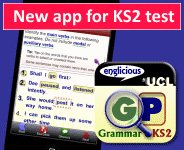Glossary: simple sentence
Explanation
A sentence containing only one main clause, with no subordinate clauses inside it, e.g. Kate visited her cousins yesterday. It may also be referred to as a single-clause sentence. This terminology is preferred in the National Curriculum.Englicious contains many resources for English language in schools, but the vast majority of them require you to register and log in first. For more information, see What is Englicious?

